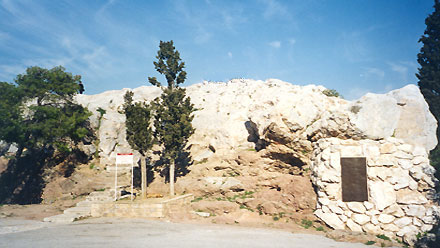The Spread of the Gospel in Hindsight: The Church’s First 1452 Years

The Areopagus in Athens, with Paul’s sermon from Acts 17 engraved on a plaque.
Image: Wikimedia Commons.
The point is this is that antagonism and persecution do two things. First, opposition produces defenders known as Apologists. An apologetic is not a defensive posture but a posture of advocacy. The Apologists, from the first and second centuries down to our day and time, are advocates of the gospel. Rhetoric was taught in the days of the Roman empire and the Christian defenders had early training in public speaking and rhetoric. An example of their eloquence can be seen by reading Paul’s address to Athenian inquirers at the Areopagus.
Secondly, antagonism and persecution furthers expansion. To get away from sustained persecution, the Christians fast became refugees and emigrants which drove them further upriver into Africa toward the Sudan or further northward up the Rhine river toward Belgica and into Germania, present-day Belgium and Germany and northward toward present-day Romania. The result was the rapid spread of the Christian faith. Christians suffered death under the persecutions of Nero all the way through to the widespread Diocletian persecutions. By the time of the Edict of Milan in A.D. 312, Christians could be found in York in England and far afield in Nisibis, close to the Caspian Sea, in the fastness of Kurdistan. Persecution is self-defeating. Instead of stamping out, it only spreads the flames of the gospel message wherever it goes.
Julian, Constantine’s youngest son, wanted to bring back the old gods of Rome and set himself to eradicate the Christian presence from Antioch. He also had to blunt the attacks of the Parthians along the banks of the Euphrates river and defend the Roman borderlands. He failed in removing this distraction. Sozomen, the Christian historian, writing in the late 300’s, told of Julian’s dying words after being struck by an arrow from a Parthian cavalryman, “O pale Galilean, you have conquered.”
Two other situations faced the Christians in those early centuries, the growth of syncretism and spiritualism, and after that, a critical situation regarding the relationship of the Christian communities with civil authority once having been freed from overt persecution.
God so loved the world, but love is not God.
First of all is syncretism. Briefly, syncretism is the belief that all religions lead to God. There are two things wrong here. First of all, God is not at the end of any religion. Secondly, the Christian faith is not a religion. It is a Gospel. It is good news. Leander Keck once observed that we see God in the face of Jesus. God was in Christ reconciling the world to himself. Jesus is Lord and Savior. God so loved the world, but love is not God. Religion is about us. Christianity is about Jesus who brought forgiveness, mercy, and regeneration of our lives. It is not God that is the issue but man. It is us that are lost, not God. The one road is the one taken to lost mankind and it led to a manger in Bethlehem and ultimately to a Cross outside Jerusalem. God invaded our world.
Category: Church History, Fall 2017


